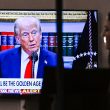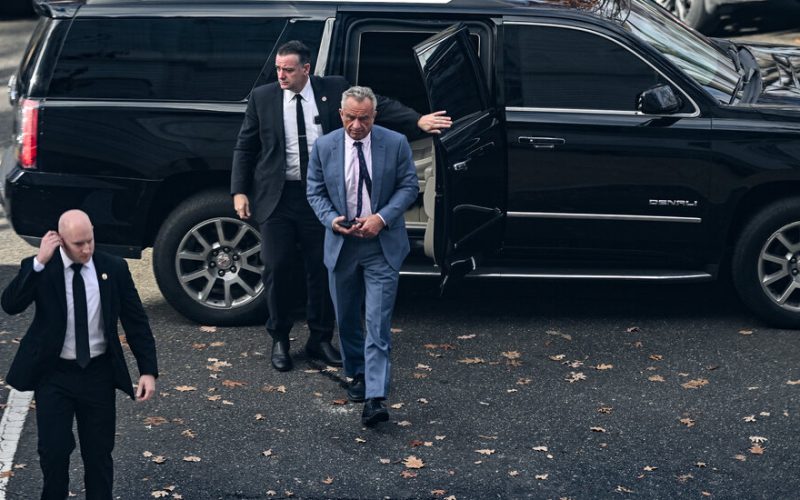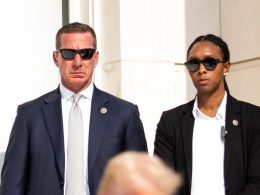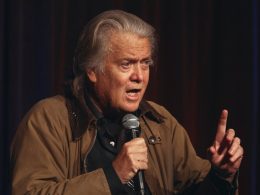Robert F. Kennedy Jr., President Trump’s pick to be health secretary, is keeping his financial stake in major litigation against Merck over a widely used vaccine given to young people, according to an ethics agreement made public on Wednesday and court documents. That conflict of interest could raise questions for lawmakers as Mr. Kennedy aims to run agencies that regulate the drugmaker.
The ethics document said Mr. Kennedy would continue to collect fees for cases in which he referred clients to Wisner Baum, a law firm suing Merck over Gardasil, a vaccine that protects against the human papillomavirus, or HPV. The vaccine is administered to adolescents to prevent cervical and other cancers later in life.
The arrangement with Wisner Baum, which also includes other matters, has earned Mr. Kennedy, one of the nation’s fiercest vaccine critics, more than $2.5 million in the past two years, according to records filed with federal election officials for his presidential run and the agreement, approved by the Office of Government Ethics as part of the confirmation process. That sum is far higher than about $200,000, the latest salary figure for the health and human services secretary, according to a former agency spokesman.
“I am entitled to receive 10 percent of fees awarded in contingency fee cases referred to the firm,” Mr. Kennedy said in the ethics filing. He wrote that he is not a lawyer in any of the cases.
The agreement says Mr. Kennedy may retain a contingency fee interest in cases that the ethics office of the Department of Health and Human Services determines do not involve the federal government. He will divest his interest in cases that do, such as those brought through the National Vaccine Injury Compensation Program.
Mr. Kennedy has railed against what he deems corruption and conflicts of interest in government and the pharmaceutical industry. He has vowed to root out what he calls “regulatory capture” — the close ties between industry and government, especially drugmakers and the Food and Drug Administration.
The ethics filings clear the way for the Senate Health Committee and the Finance Committee to schedule confirmation hearings for Mr. Kennedy. After their release, Senator Michael D. Crapo, Republican of Idaho and the Finance Committee chairman, set a hearing for Mr. Kennedy next Wednesday.
But the disclosures could also complicate Mr. Kennedy’s prospects. Two influential Republicans, Senators Mitch McConnell of Kentucky and Bill Cassidy of Louisiana, have expressed concerns about Mr. Kennedy’s views on vaccines. Mr. McConnell is the former Republican leader; Mr. Cassidy, a doctor, is the chairman of the Health Committee.
One Democratic member of the Finance Committee, Senator Elizabeth Warren of Massachusetts, said Mr. Kennedy’s finances showed “outrageous conflicts of interest that endanger public health.”
“This disclosure shows that R.F.K. Jr. made millions off of peddling dangerous anti-vaccine conspiracies,” she said in a statement. “Even worse, if he is confirmed, his finances will still be tied to the outcomes of anti-vaccine lawsuits — even as he’d be tasked with regulating them as health secretary.”
Two ethics experts who reviewed the agreement said his stake in the lawsuits appeared to be highly problematic, as the F.D.A., which approves drugs and vaccines, would fall within Mr. Kennedy’s purview as health secretary. The experts said any action Mr. Kennedy took related to Merck, one of the world’s largest drugmakers, could appear to be motivated by his financial interest in a handsome settlement.
“I think he’d have to recuse a huge amount to not appear to be extracting money from Merck,” said Richard W. Painter, a University of Minnesota law professor and former chief White House ethics lawyer. “And it almost looks like extortion.”
A spokeswoman for Mr. Kennedy declined to comment.
The first of many lawsuits claiming that young people were harmed by the HPV vaccine is on trial in Los Angeles Superior Court. Mr. Kennedy has used social media to promote the claims; in 2022 he posted a video to recruit additional plaintiffs. Merck said the allegations have no merit.
Wisner Baum paid Mr. Kennedy about $856,000 in 2024 and $1.6 million the year before, financial records filed with the government show. It was not clear from the records how much of that money came from cases involving Merck. Mr. Kennedy has also worked with Wisner Baum on other litigation, including cases related to the herbicide Roundup.
Agreements like the one submitted by Mr. Kennedy and signed by the Office of Government Ethics are based on criminal laws that prevent federal officials from self-dealing and regulations guarding against the appearance of conflicts of interest.
Wisner Baum is not the only law firm that has received client referrals from Mr. Kennedy. He has had a similar arrangement with Morgan & Morgan, which advertises itself as “America’s Largest Injury Law Firm.”
The firm recently sued some of the nation’s largest food manufacturers, accusing them of using a “cigarette playbook to fill our food environment with addictive substances that are aggressively marketed to children and minorities” — language that echoes Mr. Kennedy’s assault on ultraprocessed foods.
Mr. Kennedy does not appear to be involved in that suit and said in the ethics agreement that he would terminate that referral agreement upon confirmation. He also pledged that, if confirmed, he would end his consulting agreement with his book publisher, Skyhorse Publishing, and divest his interests in a number of companies, including Apple, Amazon and two biotech firms, CRISPR Therapeutics and Dragonfly Therapeutics.
The document outlining what Mr. Kennedy’s obligations would be is not clear on the degree to which he would need to sidestep matters related to Merck or the Gardasil vaccine, Mr. Painter, the ethics expert, said.
Mr. Painter said he believed that senators should decline to confirm Mr. Kennedy until he resolves the matter.
Virginia Canter, the chief counsel for the watchdog group State Democracy Defenders Action and a former government ethics lawyer, also reviewed the ethics statement and said Mr. Kennedy did not appear to be walled off from Merck’s business unless there was a subsequent decision by agency ethics officials. Merck makes a number of vaccines as well as Keytruda, the blockbuster cancer drug.
Ms. Canter said ethics guidelines include an impartiality rule that prompts officials to consider the appearance of bias in their actions. Given Mr. Kennedy’s potential profit, “how could he be impartial?” she asked.
Gardasil lawsuits that Mr. Kennedy worked on claim that young people developed postural orthostatic tachycardia syndrome, known as POTS, and premature ovarian failure as side effects of the vaccine.
Mr. Kennedy was a leader in organizing large law firms to get involved in the Gardasil cases, according to a report by Reuters. The cases also allege that Merck’s early studies of the vaccine “were designed in a manner to obfuscate and conceal the identification of serious injuries, including injuries with a delayed onset,” court records show.
Robert Josephson, a spokesman for Merck, noted that the Centers for Disease Control and Prevention website says the agency “has not detected any safety concerns related to POTS following HPV vaccination.”
“An overwhelming body of scientific evidence, including more than 20 years of research and development, continues to support the safety and efficacy profiles of our HPV vaccines,” Mr. Josephson said.
A study done in Scotland found that adolescents who got the HPV vaccine before they were 14 were found to have no cases of cervical cancer as adults in their late 20s to mid-30s, when 15 to 17 cases would be expected in the group.
Mr. Kennedy is likely to face a flurry of questions from lawmakers during confirmation hearings, including over his opposition to vaccines, which include a petition to revoke approval of all Covid shots during a deadly phase of the pandemic.
He has faced opposition from abortion foes who underscore his nearly lifelong affiliation with the Democratic Party. He has also made a dizzying number of claims over the years, including that the polio vaccine was more deadly than the disease.
Susanne Craig contributed reporting.








